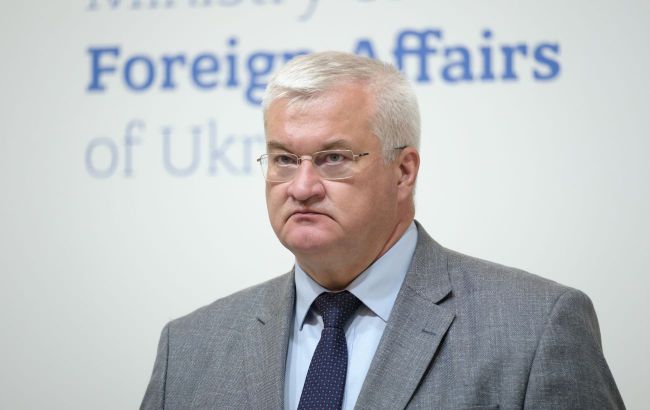Ukraine urges global condemnation of Russia's massive June 17 attack
 Ukraine's Minister of Foreign Affairs, Andrii Sybiha (Vitalii Nosach, RBC-Ukraine)
Ukraine's Minister of Foreign Affairs, Andrii Sybiha (Vitalii Nosach, RBC-Ukraine)
The Ministry of Foreign Affairs of Ukraine calls on the international community to strongly condemn Russia's massive attack on Ukrainian cities during the night of June 17. It also urges concrete steps to increase pressure on Russia and to strengthen Ukraine, according to a statement from the MFA press service.
The ministry stated that Russia launched 440 drones and 32 missiles against Ukraine. The attack was one of the largest since the start of the full-scale invasion.
"We are convinced that Putin deliberately ordered this strike during the G7 Summit in order to portray the leaders of G7 countries as weak. He is deliberately showing total disregard for international peace efforts — especially those led by the United States," the Foreign Ministry said.
The ministry emphasized that in recent weeks and months, Ukraine has demonstrated a genuine commitment to peace efforts. The country accepted a US-proposed 30-day ceasefire, sent a high-level delegation to meet with a low-level Russian delegation, proposed realistic steps toward peace, and expressed readiness for a leaders' summit to bring the war to an end.
In contrast, Russia has not taken a single constructive step toward peace. It continues to reject the US proposal for a prolonged ceasefire, issues unacceptable ultimatums, ignores Ukrainian peace proposals, and avoids a leaders' meeting that could open a real path to resolution. Instead, Moscow continues to escalate its campaign of terror — with missile strikes, civilian killings, attacks on Ukraine's energy infrastructure, and destruction of civilian facilities.
"All of this proves the necessity of increasing pressure on the aggressor. Strengthening sanctions, particularly in the energy and banking sectors, along with reinforcing Ukraine's defense capabilities, will support — not hinder — progress toward a comprehensive, just, and lasting peace," the ministry stated.
The ministry added that Ukraine is urging its partners to strike at Russia's war machine by lowering the price cap on Russian oil from $60 to $30 per barrel. This, they noted, would significantly reduce the Kremlin's revenue from oil exports and force Russia to reconsider its aggressive policies.
The Foreign Ministry also called for the accelerated delivery of modern air defense systems to Ukraine, including Patriot, NASAMS, and IRIS-T, as well as additional ammunition, to help protect Ukrainian skies and save lives.
"It is also time to move toward the full use and confiscation of immobilized Russian assets to finance Ukraine's defense industry and reconstruction," the ministry added.
"Such a decision would demonstrate that aggression has not only political, but also economic consequences for Russia."
Ukraine continues to advocate for a policy of peace through strength. This means applying maximum economic pressure on the aggressor, fully cutting off funding for its war crimes, disconnecting it from global financial systems, and completely isolating the terrorist regime.
Peace through strength also involves blocking all channels through which the Kremlin obtains resources to sustain its armed aggression against Ukraine — including a complete halt in cooperation with Russia's defense industry and its international suppliers. This, the ministry emphasized, is the only path to a just end to Russia's war against Ukraine, as Russia understands only the language of force.
"Every minute of delay in making tough decisions costs Ukrainian lives. The time has come for decisive action to counter Russian aggression and neutralize the threat Russia poses to Ukraine and the entire Euro-Atlantic community," the ministry stressed.
Officials also noted the deep cynicism in Putin's attempts to portray himself as a mediator in Middle East peace efforts, while actively engaging in terror against Ukraine.
"Let us be clear: the criminal regimes in Moscow, Tehran, and Pyongyang are working together to destabilize Europe, the Middle East, and the Indo-Pacific region," the ministry added.
June 17 attack on Ukraine
In the early hours of June 17, Russian forces launched a large-scale attack on Ukraine, deploying nearly 500 attack drones and dozens of missiles.
A Kh-101 missile strike in Kyiv's Solomianskyi district caused the collapse of an entire section of a nine-story apartment building, while a fire broke out in a nearby five-story building.
Additional damage was reported in the Darnytskyi, Podilskyi, Shevchenkivskyi, and Sviatoshynskyi districts. In total, 27 locations across the capital came under fire that night.
As a result of the strike on Kyiv, 14 people were killed and over 100 injured.
Later that morning, Russian forces also launched a massive drone attack on Odesa, once again targeting civilian infrastructure. Residential buildings, a kindergarten, an inclusive education center, garages, and other facilities were damaged. Fires broke out in multiple locations.
Two people were killed in Odesa, and more than 20 were injured.
Additionally, Ukraine has formally requested an emergency meeting of the UN Security Council in response to the overnight Russian attack.

